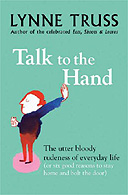
The following correction was printed in the Guardian's Corrections and clarifications column, Thursday September 8 2005
In the report below, we noted the coincidence of five books on manners but then gave details of only four of them. The missing book (the only one already out, in fact) is Simon Fanshawe's The Done Thing: Negotiating the Minefield of Modern Manners, which Random House published in June.
It must be the politest publishing war in history. This year will see the publication of no fewer than five books advising us on "modern manners", each jostling (ever so gently) for primacy.
The title most likely to win this genteel battle, Lynne Truss's Talk to the Hand: The Utter Bloody Rudeness of Everyday Life, will not appear until next month, just in time to fill our Christmas stockings.
But Truss, the author of the bestselling Eats, Shoots & Leaves, has already spelt out her zero-tolerance approach to social behaviour.
"We have, to put it plainly, become a nation of yobs," she wrote in the Daily Telegraph. "If you point out bad manners to anyone younger than 35, you risk a lash-back reflex response of shocking disproportion."
Thomas Blaikie, who has impertinently nipped in ahead of Truss with his Guide to Modern Manners, which was published yesterday, adopts a more relaxed approach. "New manners must take the Catholic approach to sin," he wrote in a manifesto last year. "It is the intention that matters. A few lapses can be overlooked."
He has no time for old-fashioned etiquette, unlike Sean Davoren, head butler at London's Lanesborough Hotel, who recently published the more disciplinarian Manners from Heaven: The Easy Way to Better Behaviour for All the Family.
"What we need are modern manners," Blaikie says. "You can have modern manners without turning into Colonel Blimp strutting up and down and finding fault. Modern manners aren't old manners. Modern manners are rational and liberating. They say, 'Do what makes sense,' and forget the rest."
What really interests Blaikie are the great philosophical questions of modern life. What do you do if the pregnant woman to whom you have given up your seat on the bus is not actually pregnant? If you lay flowers at a public shrine, should you remove the plastic wrapping?
His dicta are invariably sound: "Never tip hairdressers. They are glamorous professionals. You would never tip your child's teacher or your lawyer, so why tip the hairdresser? ... Queues are fair and just - they're worth fighting for ... Only allow mobile calls to interrupt other business if you want to appear desperate and disorganised."
Blaikie sees mobile phones as the real threat to civilised existence. "On all social occasions ... mobile phones are the enemy," he thunders. "They mean people are not joining in, they're imposing, they're disrupting ... SWITCH THEM OFF."
The arbiters of modern manners are united in their opposition to these instruments. "Almost everybody behaves badly on them because we have yet to work out the good mobile phone guide," says Robert O'Byrne, whose Mind Your Manners: A Guide to Good Behaviour was published in the spring.
Mwah! How to behave
On texting "DO NOT USE CAPITALS IN A TEXT MESSAGE: IT LOOKS AS THOUGH YOU'RE SHOUTING"
On when to forgive friends who cancel at the last moment "In very extreme circumstances and if it's a very close friend, you might let them off at very short notice if they get an absolutely fabulous, once-in-a-lifetime offer (dinner with Madonna, Posh and Becks and Sir Elton) and they are so apologetic they're barely recognisable"
On dropping in on people "The mobile phone is the great sword of hope for the dropping-in movement. If you're in the neighbourhood, phone them up, see if they're at home. Don't turn up without warning ... They might be having sex"
On greeting with a kiss "You've got to actually kiss. Air kissing, especially if accompanied by ear-splitting MWAH-MWAHs, is just annoying"
Other people's offspring "Why not intervene if other people's children are behaving badly? You take your life in your hands, but why not?"

